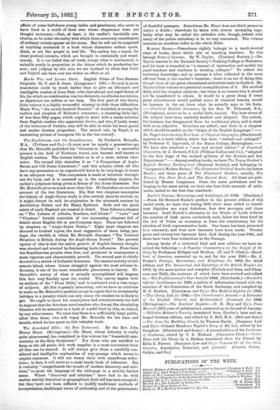The Englishman and the Scandinavian. By Frederick Metcalfe, M.A. (Triibner
and Co.)—It must now be nearly a generation ago that Mr. Metcalfe published his "Oxonian in Norway," a successful pioneer in the field of Northern travel, now become well known to English readers. The volume before us is of a more serious char- acter. The second title describes it as "A Comparison of Anglo- Saxon and Old Norse Literature ;" and this subject, which all who have any pretension to be experts will know to be very large, it treats in an adequate way. This comparison is made at intervals through- out the book, and it is summed up in the concluding chapter, the author's judgment being given in favour of the Norse literature. But Mr. Metcalfe gives us much more than this. He furnishes an excellent account of the two literatures. His first two chapters summarise the history of Anglo-Saxon study in this country since its revival, or, it might almost be said, its origination in the sixteenth century by Archbishop Parker and Sir Harry Spelman. Bede and the great saints of early England are treated in detaiL Then follows a chapter min" The Letters of Adhelm, Boniface, and Alcnin." " Laws" and " Charters " furnish materials of two interesting chapters fall of details about English life in pre-Conquest days. These are followed by chapters on "Anglo-Saxon Poetry." Eight more chapters are devoted to kindred topics, the most suggestive of them being, per- haps, the twelfth, in which Mr. Metcalfe discusses "The National Situation in Britain during the Anglo-Saxon Period." The general upshot of this is that the native growth of English literary thought was checked and stunted by dominating Latin influences. From these the Scandinavian peoples were free, and produced in consequence a more vigorous and characteristic growth. The second part is chiefly devoted to a review of Icelandic literature. The mental activity of this remote island, where letters snuggled against the most adverse in- fluences, is one of the most remarkable phenomena in history. Mr. Metcalfe's survey of what it actually accomplished will impress this fact very forcibly upon the reader. This survey begins with an excitant of the " Prose Edda," and is continued over a vast range of subjects. All this is greatly interesting, and we have no criticism to make on Mr. Metcalfe's method, except to regret that he occasionally indulges in a jocosity which can only annoy the readers he is likely to get. He ought to know his countrymen and countrywomen too well to suppose that the frivolous novel-readers who throng the circulating libraries will be attracted to a book of a solid kind by this, or, indeed, by any other means. We trust that there is a sufficiently large public, other than these, who will repay Mr. Metcalfe for the time and trouble which he has spent on this valuable work.


































 Previous page
Previous page